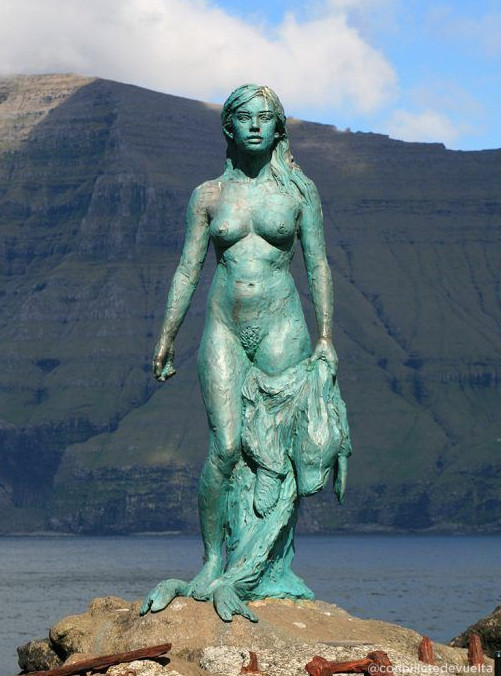Métamorphose avec les Selkies: instabilités changeantes dans l'Anthropocène conscient de lui-même

Publié 2025-03-30
Mots-clés
- contes sur le peuple des phoques,
- anthropocène,
- éthique multi-espèces
© Sarah E. McFarland (Author) 2025

Cette œuvre est sous licence Creative Commons Attribution - Pas d'Utilisation Commerciale - Pas de Modification 4.0 International.
Comment citer
Résumé
Cet article déploie la figure inspirante de la selkie pour mettre en avant des coexistences non hiérarchiques et durables entre diverses espèces, écosystèmes et êtres humains, une perspective nécessaire face au changement climatique, à la perte de biodiversité et à l'extinction des espèces. L'histoire de l'épouse selkie expose les conséquences des hiérarchies exceptionnalistes, notamment celles qui subordonnent la nature, les animaux et les femmes. En remettant en question cette pensée discriminatoire, le modèle du peuple des phoques accomplit au moins quatre choses essentielles à sa fonction de conte traditionnel irlandais et aux considérations éthiques qu'il suscite dans un Anthropocène conscient de soi. À la base de ce récit se trouve une vision du monde flexible, contrastant avec les représentations d'autrui biologique qui fixent leurs corps ; le récit lui-même est une mise en garde contre l'arrogance et la domination, et une réprimande de l'impérialisme ; et enfin, il développe une leçon sur la manière d'être une personne juste. Ici, je renégocie l’exceptionnalisme humain et les ontologies que l’illusion soutient en tournant vers les mythes des selkies et d’autres histoires de femmes métamorphosées pour imaginer des manières alternatives de penser et de vivre dans l’Anthropocène conscient de soi.
Références
- Barad, Karen. Meeting the Universe Halfway: Quantum Physics and the Entanglement of Matter and Meaning. Durham: Duke UP, 2007.
- Best, Andy. “Imagining Godzilla: An Art Research Network Platform.” In Situating Sustainability: A Handbook of Contexts and Concepts, edited by C. Parker Kreig and Reetta Toivanen, 293-330. Helsinki UP, 2021.
- Boland, Eavan. Outside History: Selected Poems 1980-1990. W.W. Norton, 1990.
- Calarco, Matthew. “Identity, Difference, Indistinction.” CR: The New Centennial Review 11,2 (Fall 2011): 41-60.
- Chakrabarty, Dipesh. “The Climate of History: Four Theses.” Critical Inquiry 35, 2 (Winter 2009): 197-222.
- Challenger, Melanie. How to Be Animal: A New History of What It Means to be Human. Penguin, 2021.
- Colebrook, Claire. The Death of the PostHuman: Essays on Extinction, Volume One. Open Humanities P, 2014.
- Darwin, Charles. Darwin Correspondence Project. “Letter no. 2647,” https://www.darwinproject.ac.uk/letter/?docId=letters/DCP-LETT-2647.xml
- Deleuze, Gilles and Félix Guattari. A Thousand Plateaus. Translated by B. Massumi. U Minnesota P, 1987.
- Estés, Clarissa Pinkola. Women Who Run with the Wolves: Myths and Stories of the Wild Woman Archetype. Balentine, 1992.
- Haraway, Donna. The Companion Species Manifesto: Dogs, People, and Significant Otherness. Prickly Paradigm, 2003.
- -----. Staying with the Trouble: Making Kin in the Chthulucene. Duke UP, 2016.
- Keller, Lynn. Recomposing Ecopoetics: North American Poetry of the Self-Conscious Anthropocene. U Virginia P, 2017.
- Kimmerer, Robin Wall. Braiding Sweetgrass: Indigenous Wisdom, Scientific Knowledge, and the Teachings of Plants. Milkweed, 2013.
- Le Couteur, Peter [Clair]. “Slipping off the Sealskin: Gender, Species, and Fictive Kinship in Selkie Folktales.” Gender Forum: An Internet Journal for Gender Studies 55 (2015): 55-82.
- Latour, Bruno. Facing Gaia: Eight lectures on the New Climatic Regime. Translated by Catherine Porter. Polity, 2017.
- McFarland, Sarah E. Ecocollapse Fiction and Cultures of Human Extinction. Bloomsbury, 2021.
- Møllegaard, Kirsten. “Global Flows in Coastal Contact Zones: Selkie Lore in Neil Jordan’s Ondine and Solveig Eggerz’s Seal Woman.” In Unsettling Assumptions: Tradition, Gender, Drag, edited by Pauline Greenhill and Diane Tye, 93-111. Utah State UP, 2014.
- Ní Dhomhnaill, Nuala. Rhoga Dánta. Translated by Michael Hartnett. New Island Publishers, 1993.
- Nixon, Rob. “The Anthropocene: Promise and Pitfalls of an Epochal Idea.” Edge Effects, 6 November 2014, updated 12 October 2019. https://edgeeffects.net/anthropocene-promise-and-pitfalls.
- Odell, Jenny. How to Do Nothing: Resisting the Attention Economy. Melville House, 2019.
- Ondine. Directed by Neil Jordan. Wayfare Entertainment, 2009.
- Russell, Richard Rankin. “W.B. Yeats and Eavan Boland: Postcolonial Poets?” In W.B. Yeats and Postcolonialism, edited by Deborah Fleming, 101-32. Locust Hill Press, 2001.
- Rustick, Susan M. “Held Hostage by the Anthropocene.” In Thinking about Animals in the Age of the Anthropocene, edited by Morten Tønnessen, Kristin Armstrong Oma, and Silver Rattasepp, 3-17. Lanham: Lexington Books, 2016.
- The Secret of Roan Inish. Directed by John Sayles. Jones Entertainment and Skerry Productions, 1994.
- Shotwell, Alexis. Against Purity: Living Ethically in Compromised Times. U Minnesota P, 2016.
- Song of the Sea. Directed by Tomm Moore. Cartoon Saloon, 2014.
- Tatar, Maria. “Introduction: The Odd Couple in Tales as Old as Time.” In Beauty and the Beast: Classic Tales about Animal Brides and Grooms from Around the World, edited by Maria Tatar, ix-xxx. Penguin, 2017.
- Thomson, David. The People of the Sea: A Journey in Search of the Seal Legend. Counterpoint, 2000.
- Urpeth, James. “Animal Becomings.” In Animal Philosophy, edited by Matthew Calarco and Peter Atterton, 101-10. Continuum, 2004.
- Weil, Kari. Thinking Animals: Why Animal Studies Now? Columbia UP, 2012.
- Williams, Joy. Harrow: A Novel. Knopf Doubleday, 2022.
- Williamson, Duncan. Tales of the Seal People. Interlink, 2005.
